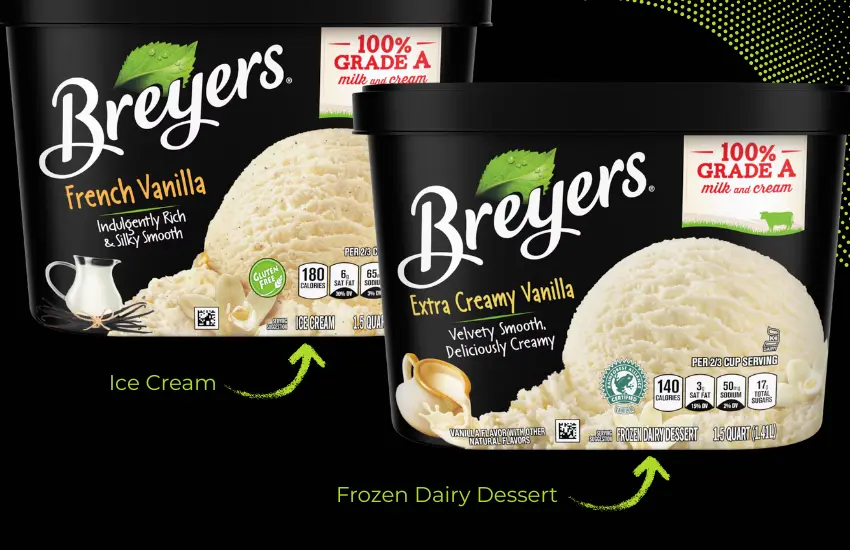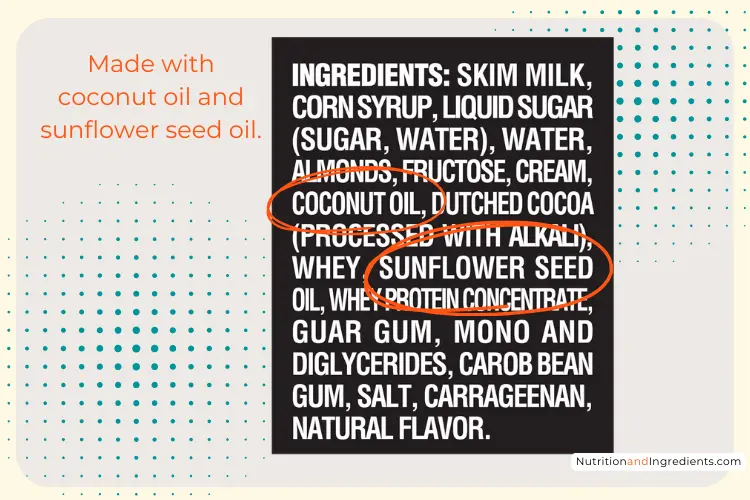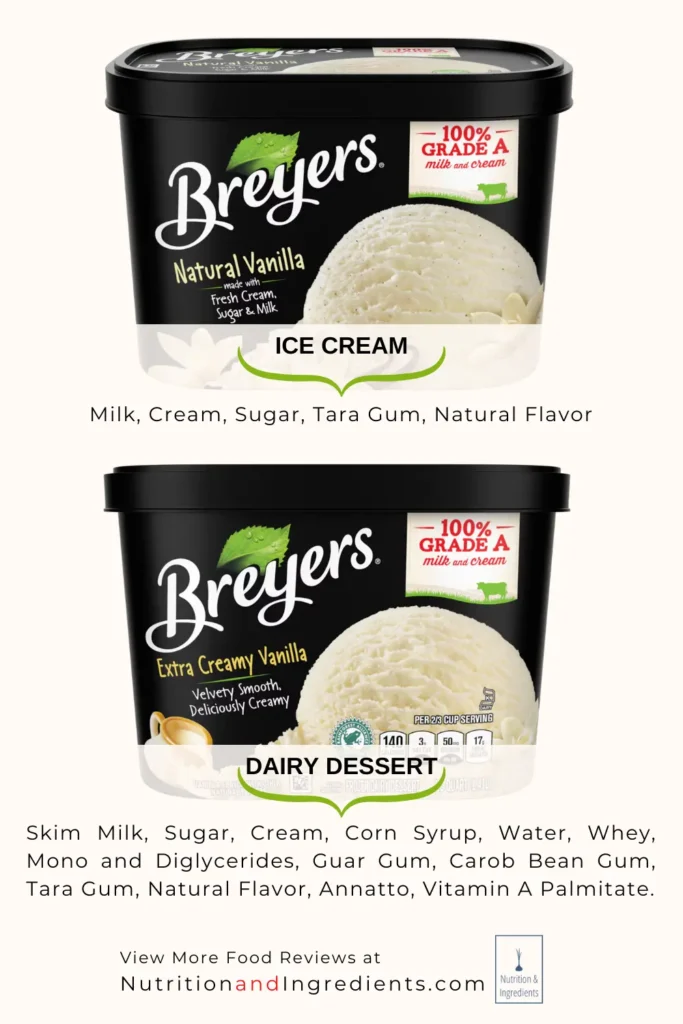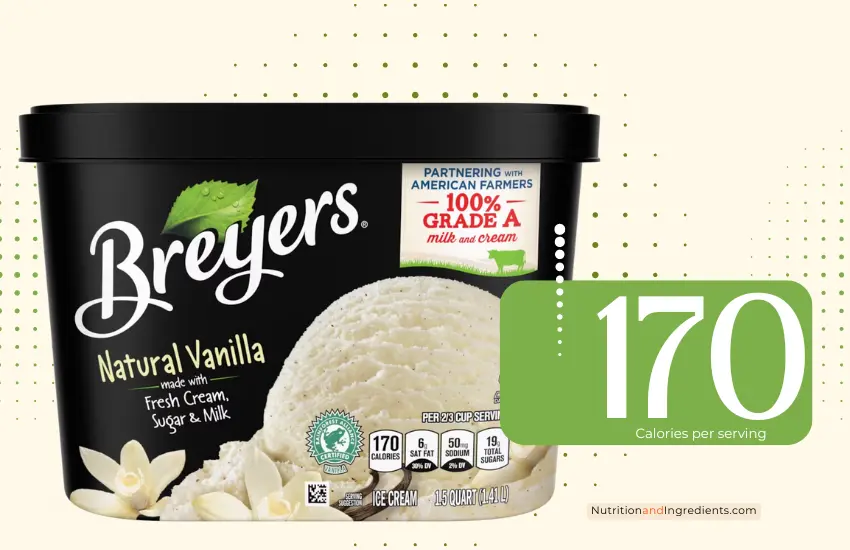Breyers Ice Cream and Frozen Dairy Desserts

Breyers offers a wide variety of ice cream and frozen desserts. The texture, flavor, and ingredients are similar to other brands in the marketplace. Even the brand name is often confused by one of its top competitors: Dreyer’s (a Nestle brand).
This food review provides a detailed overview of Breyers sweet dairy treats. It includes an explanation of the difference between ice cream and frozen dairy desserts, an analysis of calories by macronutrient, and the ingredients for many of the brand’s most popular flavors.
Breyers Ice Cream vs Frozen Dessert
Is It Ice Cream?
The first thing to note is not all of the containers in your grocer’s Ice Cream freezer is actually ice cream. At least not as it’s defined by the USDA.
Ice cream is made primarily with 100% real dairy products, which may include milk, cream, milk powder, and whey. It may also include other additives that act as stabilizers, emulsifiers, and flavoring agents.
By comparison, other frozen dessert options look like ice cream and taste similar to ice cream, but are made with various other ingredients, including oils.

Moreover, even if the desserts share some of the same ingredients as real ice cream, the dominant ingredients in frozen desserts that don’t qualify as ice cream are often added sugars, water, gums, or a type of oil.

Standards for Ice Cream
According to the U.S. Department of Agriculture, there are certain grades and standards that must be met in order for a product to be labeled as “Ice Cream.”
The standards for ice cream include the following:
Additional standards apply when optional bulky ingredients such as cocoa solids, flavors, or sweeteners are added.
Marketed as Frozen Dairy Dessert
Food products that do not meet such standards cannot be labeled as Ice Cream.
Breyers uses the term “Frozen Dairy Dessert” for many of its products, including Vanilla Fudge Twirl, Extra Creamy Vanilla, and Chocolate Chip Cookie Dough flavors.
Breyers Summary Nutrition Facts by Flavor
Breyers ice cream and frozen dairy desserts do have a couple of nutrition facts in common.
Use the following table to compare calories, fat, carbs, and added sugars in many of Breyers top ice cream and frozen dessert flavors.
Breyers Nutrition Facts
<< Swipe table right to left for more nutrition facts
| Flavor | Type | Calories | Fat | Carbs | Added Sugars |
|---|---|---|---|---|---|
| French Vanilla | Ice Cream | 180 | 10g | 21g | 13g |
| Vanilla Chocolate | Ice Cream | 170 | 9g | 21g | 15g |
| Vanilla Chocolate Strawberry | Ice Cream | 160 | 8g | 20g | 14g |
| Natural Vanilla | Ice Cream | 170 | 9g | 19g | 14g |
| Coffee | Ice Cream | 140 | 4g | 23g | 12g |
| Chocolate Truffle | Ice Cream | 200 | 8g | 30g | 17g |
| Chocolate Chip | Dairy Dessert | 170 | 7g | 26g | 14g |
| Black Raspberry Chocolate | Dairy Dessert | 180 | 5g | 30g | 16g |
| Chocolate Chip Cookie Dough | Dairy Dessert | 190 | 7g | 30g | 15g |
| Rocky Road | Dairy Dessert | 190 | 7g | 29g | 14g |
| Cookies & Cream | Dairy Dessert | 190 | 6g | 29g | 17g |
| Chocolate Pretzel Swirl | Dairy Dessert | 180 | 8g | 27g | 10g |
| Vanilla Fudge Twirl | Dairy Dessert | 150 | 4.5g | 26g | 13g |
| Extra Creamy Vanilla | Dairy Dessert | 140 | 4.5g | 24g | 14g |
| Butter Pecan | Dairy Dessert | 170 | 8g | 22g | 10g |
| Double Chocolate Brownie Batter | Dairy Dessert | 180 | 7g | 29g | 16g |
| Extra Creamy Chocolate | Dairy Dessert | 140 | 4.5g | 23g | 13g |
| CarbSmart Coffee Cookie Crunch | Dairy Dessert | 120 | 6g | 17g | 2g |
Calories
Total calories in Breyers ice creams and frozen dairy desserts vary by flavor. The total ranges from 120 to 200 calories per serving.
Calories by Macronutrient
Carbohydrates contribute the highest proportion, up to nearly 70%, of total calories.
Fat makes up between one quarter to one half of the total calories. And approximately 4% to 8% of calories is from protein.
SUMMARY OF CALORIES BY MACRONUTRIENT PER SERVING

Breyers Ingredients and Allergens
As noted above, the ingredients used for products labeled and marketed as Ice Cream must adhere to standards set by the USDA. This is apparent from Breyers use of the term “Frozen Dairy Dessert” for products that do not qualify as ice cream.
The frozen dessert terminology is not unique to Breyers. It’s used by OREO, Dreyer’s, Blue Bunny, and Klondike, among many other brands.
Breyers ice cream generally contains fewer ingredients compared to the alternative dessert option.
For example, here is a comparison of the ingredients between two of the brand’s vanilla flavored treats: Natural Vanilla (its original vanilla ice cream) and Extra Creamy Vanilla (a vanilla-flavored frozen dairy dessert).
Comparison of Ingredients
|
Ingredient |
Natural Vanilla |
Extra Creamy Vanilla |
|---|---|---|
|
Milk |
Yes |
— |
|
Cream |
Yes |
Yes |
|
Sugar |
Yes |
Yes |
|
Natural Flavor |
Yes |
Yes |
|
Tara Gum |
Yes |
Yes |
|
Skim Milk |
— |
Yes |
|
Corn Syrup |
— |
Yes |
|
Water |
— |
Yes |
|
Whey |
— |
Yes |
|
Mono and Diglycerides |
— |
Yes |
|
Guar Gum |
— |
Yes |
|
Carob Bean Gum |
— |
Yes |
|
Annatto |
— |
Yes |
|
Vitamin A Palmitate |
— |
Yes |

Ingredients and allergens vary by flavor. The following chart provides a summary of ingredients in popular Breyers ice cream flavors and Breyers frozen desserts.
Ingredients by Flavor
|
CarbSmart Coffee Cookie Crunch Dessert |
|
Skim Milk, Cream, Maltitol Syrup, Water, Polydextrose, Coconut Oil, Glycerin, Coffee Extract, Whey, Sugar, Dutched Cocoa, Soluble Corn Fiber, Enriched Wheat Flour, Mono- and Diglycerides, Vegetable Oil (soybean, palm), Guar Gum, Carob Bean Gum, Dried Cane Syrup, Natural Flavor, Cocoa, Soy Lecithin, Corn Starch, Sodium Bicarbonate, Milk, Salt, Acesulfame Potassium, Sucralose. |
|
Chocolate Truffle Ice Cream |
|
Milk, Cream, Sugar, Dutched Cocoa, Corn Syrup, Coconut Oil, Whey, Canola Oil, Vegetable Gums, Mono and Diglycerides, Salt, Cocoa, Soy Lecithin, Natural Flavor, and Annatto. |
|
Coffee Dessert |
|
Skim Milk, Corn Syrup, Sugar, Water, Cream, Coconut Oil, Coffee Extract, Whey, Mono and Diglycerides, Guar Gum, Carob Bean Gum, Tara Gum, Annatto, and Natural Flavor. |
|
Cookies & Cream Dessert |
|
Milk, Liquid Sugar, Sugar, Wheat Flour, Cream, Corn Syrup, Palm Oil, Skim Milk, Whey, Dutched Cocoa, Natural Flavor, Salt, Baking Soda, Soy Lecithin, Mono- and Diglycerides, Carob Bean Gum, Guar Gum, Vitamin A Palmitate, and Tara Gum. |
|
Double Chocolate Brownie Batter Dessert |
|
Skim Milk, Corn Syrup, Sugar, Fructose, Coconut Oil, Dutched Cocoa, Enriched Flour, Cream, Water, High Fructose Corn Syrup, Corn Oil, Whey, Cocoa, Palm Oil, Molasses, Butter, Soybean Oil, Mono and Diglycerides, Natural Flavor, Guar Gum, Soy Lecithin, Carob Bean Gum, Potassium Sorbate, Sodium Bicarbonate, and Salt. |
|
Extra Creamy Vanilla Dessert |
|
Skim Milk, Sugar, Cream, Corn Syrup, Water, Whey, Mono and Diglycerides, Guar Gum, Carob Bean Gum, Tara Gum, Natural Flavor, Annatto, Vitamin A Palmitate. |
|
French Vanilla Ice Cream |
|
Milk, Cream, Sugar, Corn Syrup, Egg Yolks, Whey, Vegetable Gums, Mono and Diglycerides, Natural Flavor, Annatto, Salt. |
|
Natural Vanilla Ice Cream |
|
Milk, Cream, Sugar, Tara Gum, and Natural Flavor. |
|
Vanilla Chocolate Strawberry Ice Cream |
|
Milk, Cream, Sugar, Water, Strawberries, Whey, Dutched Cocoa, Tara Gum, and Natural Flavor. |
|
Vanilla Fudge Twirl Dessert |
|
Skim Milk, Corn Syrup, Water, Sugar, Fructose, Coconut Oil, Whey, Cream, Dutched Cocoa, Vegetable Gums, Mono and Diglycerides, Salt, and Natural Flavor. |
Nutrition facts, prices, and ingredients are based on available information as of the date of publication. Restaurants and food manufacturers may change recipes or formulations without notice. Check package labels and ask the product manufacturer or restaurant for the most up-to-date information. Unless otherwise stated, %DV is based on a 2,000 calorie diet. All reports and reviews published on this site are for informational purposes only. NutritionandIngredients.com does not provide healthcare advice or dietary recommendations. Always consult your licensed physician for any healthcare or dietary advice.
